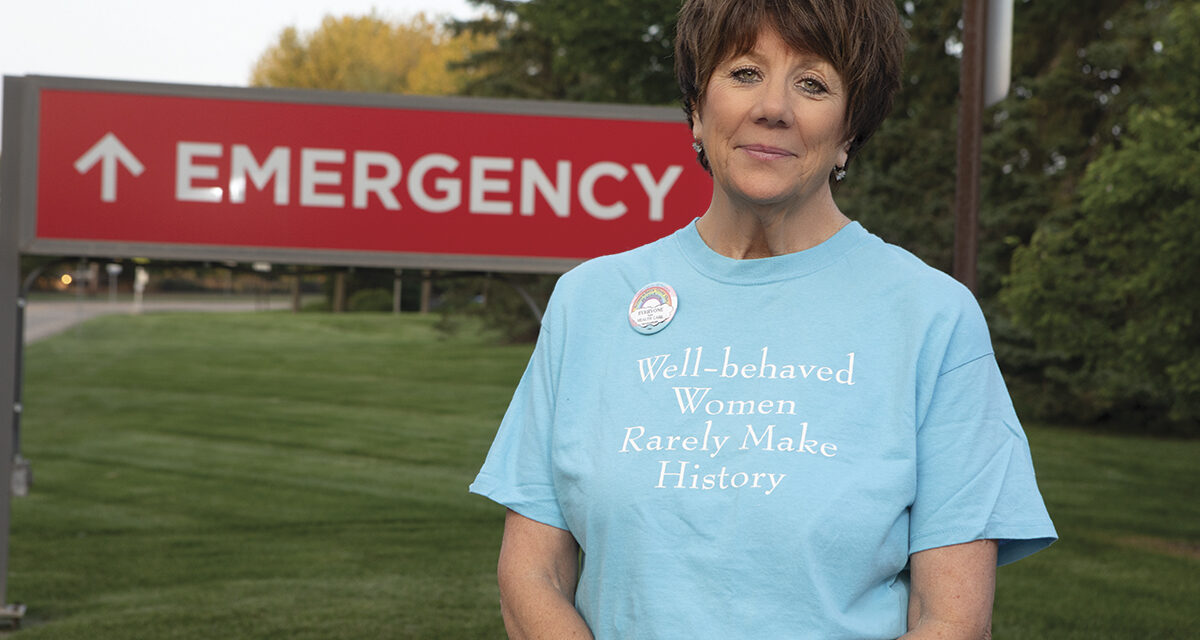Ecolution reporting made possible by Seward Co-op. Seward Co-op has been a community-owned grocer since 1972. Together, we continue to cultivate a cooperative economy.

Rose Roach is the national coordinator for the Labor Campaign for Single Payer, advocating for U.S. health care reform on behalf of workers. Photo Sarah Whiting
This article is a joint publication of Minnesota Women’s Press and Workday Magazine, a non-profit newsroom devoted to holding the powerful accountable through the perspective of workers.
In the United States, we spend more on health care than other high-income countries, but we have some of the worst health outcomes.
When employers offer health care benefits to their employees, those benefits tend to subtract from employee compensation, instead of employer profit. This can keep wages low, which can lead to labor disputes, including strikes.
Since 2009, one national coalition, the Labor Campaign for Single Payer, has been growing support inside the labor movement to unlink health care from employment by establishing a single-payer health care system in the U.S.
A single-payer system would involve one public health plan that covers the costs for all residents, instead of the system we have now: a multi-payer system of public and private plans.
Rose Roach is the new national coordinator for the campaign, and has worked in the labor movement for over 30 years. She became interested in health policy two decades ago when she noticed that bargaining for health benefits from employers wasn’t solving the root of the problems unions were trying to address. “[Unions and employers] just scream at each other about the high cost [of health care] and who’s going to pay for it,” she says. “It’s never, ‘why does it cost this much in the first place?’”
Roach grew up in Saint Paul, where her father was a union brewer at the Schmidt Brewery. She started her career at the Minnesota School Employees Association, where she became executive director. She was a field director at the California School Employees Association before returning to Minnesota in 2014 to become the executive director of the Minnesota Nurses Association (MNA), from which she recently retired.
In her “retirement,” Roach is campaigning at both the state and national level as the chair of Healthcare for All Minnesota and with the Labor Campaign for Single Payer.
Minnesota Women’s Press and Workday Magazine spoke with Roach about how universal health care would impact working people, and how the labor movement can fight for health justice.
How did you get involved in health justice?
In California, [I witnessed] a mother who could no longer afford the cost of the family medical plan. She had to choose which child to cover. How do you do that? The child she didn’t cover ended up in a horrific automobile accident not long after, and they suffered bankruptcy issues because of medical debt. This doesn’t happen in any other industrialized nation in the world. Upon retirement, I decided I wanted to get labor unions involved in transforming our health care system.
How do you talk to unions about supporting single-payer health care?
When we talk with trade unionists, we ask, “When is the last time you had a cost-of-living or above a cost-of-living raise?” [We ask the unions] whether money has been dedicated to keeping health care premiums down, having the employer pay so it’s not out of pocket. [We help unions understand how that causes] wage stagnation, which isn’t good for workers, and it’s not good for our economy. From a worker perspective, it makes much more sense for us to [bargain] in a more fiscal way. Get [health care] off the bargaining table, so we don’t have to use it as a chip. We can focus on bargaining for true wage increases and child care benefits.
We are all held hostage to this industry, and they are squandering our precious health care dollars.
We just need a good segment of the population to say this isn’t making economic sense for our country anymore.
In this country, 68,000 people a year die waiting for health care because they can’t afford it. That is immoral.
We’re figuring out how to get beyond what we call “resolutionary politics” and get to revolutionary politics. Lots of unions will pass a resolution saying we support Medicare for All, but they haven’t politically prioritized it and they’re not resourcing the campaign to win it — some of that is because unions are under attack.
[Editor’s Note: Although there has been growing popular support for unions and a spike in union elections in recent years, union density in the U.S. is still low compared to other industrialized countries, and many employers continue to fight against unionization.]
I’ve spoken with a few nurses about how single payer would put less strain on their workload because if patients could afford the care they need to maintain their health, they wouldn’t leave treatment until the issue has progressed.
Nurses will talk about how patients are so much sicker these days than they have ever seen in their careers. People will avoid going in [because of finances]. By the time they do, they need around-the-clock care.
The Keeping Nurses at the Bedside Act was passed in part by the Minnesota legislature this year. The original bill had language about staffing committees at the hospitals involving 30 percent of the bedside nurses, not nurse managers. That’s a very important distinction, because bedside nurses provide input into what staffing needs are based on acuity needs of their patients. That part of the bill did not pass. MNA nurses wanted to start at a place where they could have labor and management work together, and even that was a threat [to health care companies]. Mayo Clinic came in and said they would pull the $4 billion of funding to build their destination medical center in southeast Minnesota if that part of the bill passed.
The problem is, hospitals have said that they will never negotiate staffing ratios with unions. When we try to bring legislation [about staffing ratios] forward, [hospitals] say to the legislators, “Let us deal with that in the collective bargaining process.” Nurses [have to] get a hold of the legislators and say, “Yeah, they’re pulling your leg, stop letting them do that.”
This is a public health crisis. If we don’t have enough nurses to care for us at our most vulnerable, that’s not good for any of us. We should be regulating that just like we regulate child care, where there can only be so many infants per adult.
Some employers don’t support a single-payer system because they use health care benefits as a tool to compete for workers. How do you engage employers and businesses, especially small businesses?
More and more [business owners] are starting to think there has got to be a better way for us to do this. Small business owners are overwhelmingly supporting some kind of plan, whether it’s a state-based Minnesota Health Plan or national Medicare for All, because they are hampered by this benefit on their balance sheet. It stifles competition, they can’t expand their business, and they’re not able to hire more workers. They are tired of trying to be experts at health care and insurance. They just want to run a business. We are probably never going to get the 3Ms and the General Mills of the world [on board with the campaign], and that’s fine. They want to have their own plan. But right now people are tied to an employer simply because they have a family member that’s in a health care crisis.
What is the labor campaign focused on right now?
On a national level, President Biden has said he doesn’t support Medicare for All, but he is willing to drop the age of eligibility from 65 to 60 — that would be a positive step forward. The labor campaign is restructuring to involve more union leaders and members in the work of broadening labor support to fight for Medicare for All. In Minnesota, we passed a bill this year that will fund a study comparing the Minnesota Health Plan to our current system. We’ll finally have some hardcore financing to help us move the bill forward. Those are wins for the movement.
Is there anything that you want people to know about yourself or the work that you do?
We’ve seen the leaders [in health justice] are overwhelmingly women, and they’re people of color and in the LGBTQ+ community, because those are the people most impacted by the structure of this current system. It is important to continue to bring those voices forward. I’m a white woman. I’m honored to speak and help, but I’ll admit my privilege here — I’m not worried about health care at this point in my life, but a lot of people that don’t look like me are. They need to have a platform to tell their story so we can achieve health care justice.
Visit laborforsinglepayer.org for resources on becoming involved in the campaign, including becoming an affiliate, engaging in policy work, starting advocacy committees, and organizing or training around health care justice.








